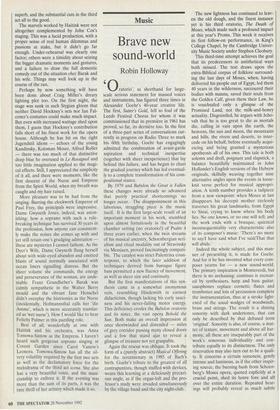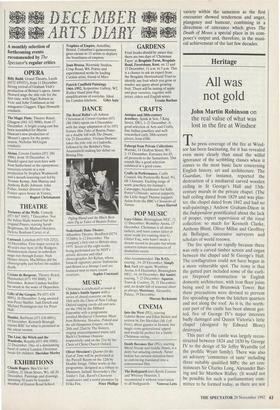Music
Brave new sound-world
Robin Holloway
Oratorio', as shorthand for large- scale serious statement for massed voices and instruments, has figured three times in Alexander Goehr's 40-year creative life. The first, Sutter's Gold, fell so foul of the Leeds Festival Chorus for whom it was commissioned that its premiere in 1961 has proved, so far, its derniere too. In the first of a three-part series of conversations cur- rently in progress on Radio Three to mark his 60th birthday, Goehr has engagingly admitted the combination of avant-garde aspiration and technical inexpertise (together with sheer inexperience) that lay behind this failure, and has begun to chart the gradual journey which has led eventual- ly to a complete transformation of his com- positional stance.
By 1979 and Babylon the Great is Fallen these changes were already so advanced that purely practical shortcomings no longer occur. The disappointment in this laborious, straggling piece is the music itself. It is the first large-scale result of an important moment in his work, stumbled upon almost fortuitously in the beautiful chamber setting (no oratorio!) of Psalm 4 three years earlier, when the twin streams of his musical ancestry, Schoenbergian seri- alism and ritual modality out of Stravinsky via Messiaen, proved fascinatingly compati- ble. The catalyst was strict Palestrina coun- terpoint, to which the later addition of techniques derived from baroque figure bass permitted a new fluency of movement, as well as sheer size and continuity.
But the first manifestations of this syn- thesis came in a somewhat anonymous vein, resembling Hindemith in earnest didacticism, though lacking his early sauci- ness and his never-failing motor energy. This deficiency erodes the Babylon oratorio and its sister, the vast opera Behold the Sun. Both make an overall impression at once shortwinded and distended — miles of grey corridor passing many closed doors and a few that stand ajar to reveal a glimpse of treasure not yet graspable.
Again the rescue was oblique. It took the form of a (purely abstract) Musical Offering for the tercentenary in 1985 of Bach's birth. Goehr's tribute to the greatest of all contrapuntists, though stuffed with devices, wears this learning at a deliciously precari- ous angle, as if the organ-loft and the pro- fessor's study were invaded simultaneously by the village band and the city night-club. The new lightness has continued to leav- en the old dough, and the finest instance yet is his third oratorio, The Death of Moses, which made such a profound impact at this year's Proms. This week it receives its first follow-on performance, in King's College Chapel, by the Cambridge Univer- sity Music Society under Stephen Cleobury.
This third-time attempt achieves the goal that its predecessors in antithetical ways both missed. The text draws upon the extra-Biblical corpus of folklore surround- ing the last days of Moses, when, having delivered his people out of Egypt, led them 40 years in the wilderness, succoured their bodies with manna, saved their souls from the Golden Calf, given them their Law, he is vouchsafed only a glimpse of the Promised Land, not the milk-and-honey actuality. Disgruntled, he argues with Jeho- vah that he is too great to die as mortals die, calling in vain upon the earth, the heavens, the sun and moon, the mountains and hills, the rivers and deserts, to inter- cede on his behalf, before eventually acqui- escing and being granted a mysterious apotheosis all of his own. This tale is both solemn and droll, poignant and slapstick, a balance beautifully maintained in John Hollander's English versions of the Hebrew originals, skilfully weaving together nine alternative angles upon the events in loose- knit verse perfect for musical appropri- ation. A tenth number provides a tailpiece from a new viewpoint: when Moses at last disappears his decrepit mother tirelessly traverses his great landmarks, from Egypt to Sinai, crying to know where his body lies. No one knows, or no one will tell; and the work ends with a brusque, quizzical inconsequentiality very characteristic also of its composer's music: 'There's no more to say/I have said what I've said/That that will abide.'
Indeed the whole subject, and this man- ner of presenting it, is made for Goehr. And for it he has invented what every com- poser yearns for — a new sound-world. The primary inspiration is Monteverdi, but there is no archaising: continuo is recreat- ed by synthesisers, harp and bass guitar; saxophones replace cornetti; flutes and trombones and lots of percussion complete the instrumentation, thus at a stroke light- ened of the usual wodges of woodwinds, brass and strings. The result is a shining sonority with dark undertones, that can only be described by that debased term 'original'. Sonority is also, of course, a mat- ter of texture, movement and above all har- mony; all these are inseparably part of the work's sonorous individuality and con- tribute equally to its distinctness. The only reservation may also turn out to be a quali- ty. It concerns a certain sameness, gently intense and luminous, as if the other inspir- ing source, the burning bush from Schoen- berg's Moses opera, quoted explicitly at a crucial point, shed its lustre fore and aft over the entire duration. Repeated hear- ings will probably reveal as much subtle
variety within the sameness as the first encounter showed tenderness and anger, plangency and humour, combining in a directness of utterance which gives The Death of Moses a special place in its com- poser's output and, therefore, in the musi- cal achievement of the last few decades.











































































 Previous page
Previous page